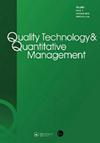Optimal replacement policies for systems under sporadic shocks and healing impetus
IF 3
2区 工程技术
Q3 ENGINEERING, INDUSTRIAL
Quality Technology and Quantitative Management
Pub Date : 2022-04-25
DOI:10.1080/16843703.2022.2051846
引用次数: 2
Abstract
ABSTRACT A system is experiencing two kinds of sporadic impacts: valid shocks that cause damage instantaneously, and positive interventions that induce partial healing. Whereas each shock inflicts a fixed magnitude of damage, the accumulated effect of positive interventions nullify the damaging effect of one shock. The system is said to be in stage 1, when it can possibly heal, until the net count of impacts (valid shocks registered minus valid shocks nullified) reaches a threshold . Thereafter, the system enters stage 2, when no more healing is possible. The system fails when the net count of valid shocks reaches another threshold . The inter-arrival times between successive valid shocks and those between successive positive interventions are independent and follow arbitrary distributions; thereby we remove the restrictive assumption of exponential distributions often found in the literature. We find the distributions of the sojourn time in stage 1 and the failure time of the system. Finally, we find the optimal values of choice variables that minimize the expected maintenance cost per unit time for three different maintenance policies.偶发性冲击和愈合动力下系统的最优替代政策
一个系统正在经历两种偶发影响:即时造成损伤的有效冲击和诱导部分愈合的积极干预。虽然每次冲击造成的损害程度是固定的,但积极干预的累积效果会抵消一次冲击的破坏性影响。系统被认为处于第一阶段,此时它可能会恢复,直到净冲击计数(有效冲击登记减去有效冲击无效)达到阈值。此后,系统进入第二阶段,此时不可能有更多的治疗。当净冲击次数超过阈值时,系统故障。连续有效冲击和连续积极干预之间的间隔到达时间是独立的,服从任意分布;因此,我们消除了文献中经常发现的指数分布的限制性假设。得到了系统在阶段1的停留时间和失效时间的分布。最后,我们找到了选择变量的最优值,使三种不同的维护策略的单位时间预期维护成本最小化。
本文章由计算机程序翻译,如有差异,请以英文原文为准。
求助全文
约1分钟内获得全文
求助全文
来源期刊

Quality Technology and Quantitative Management
ENGINEERING, INDUSTRIAL-OPERATIONS RESEARCH & MANAGEMENT SCIENCE
CiteScore
5.10
自引率
21.40%
发文量
47
审稿时长
>12 weeks
期刊介绍:
Quality Technology and Quantitative Management is an international refereed journal publishing original work in quality, reliability, queuing service systems, applied statistics (including methodology, data analysis, simulation), and their applications in business and industrial management. The journal publishes both theoretical and applied research articles using statistical methods or presenting new results, which solve or have the potential to solve real-world management problems.
 求助内容:
求助内容: 应助结果提醒方式:
应助结果提醒方式:


